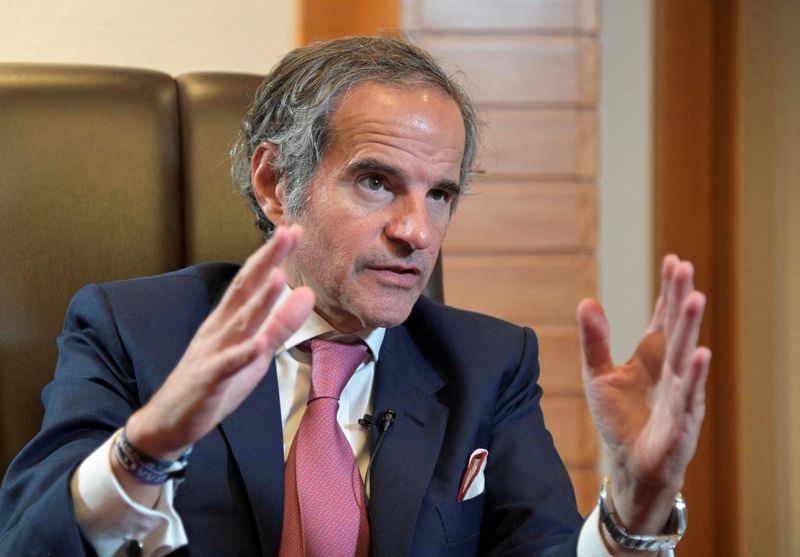By Francois Murphy
VIENNA (Reuters) - U.N. nuclear watchdog chief Rafael Grossi flew to Iran on Monday hoping to bolster his agency's oversight of Tehran's atomic activities after various setbacks, but analysts and diplomats say he has limited leverage and must be wary of empty promises.
Then-U.S. President Donald Trump's decision in 2018 to ditch a landmark deal between Iran and major powers that exchanged nuclear restrictions for sanctions relief caused that accord to unravel. Iran has since accelerated its uranium enrichment and reduced cooperation with the International Atomic Energy Agency.
"The level of inspection (in Iran) is not at the level we should have," Grossi told Sky News last month.
"Given the depth and breadth of the programme, we should be having additional monitoring capabilities," said Grossi, who is due to meet officials including chief nuclear negotiator Ali Bagheri Kani and Foreign Minister Hossein Amirabdollahian.
Iran is enriching uranium to up to 60% purity, close to the around 90% of weapons grade. If that material were enriched further, it would suffice for two nuclear weapons, according to an official IAEA yardstick.
Iran has also limited the IAEA's ability to do its job properly. It faces an array of problems, from Tehran's continued failure to explain uranium traces found at undeclared sites to its barring of almost all the IAEA's top enrichment experts.
When he returned from his last Iran trip in March 2023, Grossi believed he had secured sweeping concessions from Tehran outlined in a vaguely-worded "Joint Statement".
Little came of it, IAEA reports to member states show.
Grossi had hoped that statement would lead to re-installation of surveillance cameras and other monitoring equipment removed at Iran's behest in 2022. Instead, only a fraction of the cameras the IAEA wanted were re-installed.
DOUBTS
The IAEA has now lost track of parts of Iran's nuclear programme of which the deal gave it oversight, such as the number of centrifuges -- machines that enrich uranium -- Iran possesses. The IAEA describes this in its reports as losing "continuity of knowledge".
That has raised fears Tehran could set up a secret enrichment site, although there is no indication of one, diplomats say.
"The IAEA is understandably more concerned about the invisible, rather than the visible, part of Iran's nuclear programme," said Ali Vaez of the International Crisis Group.
Iranian nuclear chief Mohammad Eslami, speaking about Grossi's visit, said on May 1 that Tehran hoped to strengthen cooperation with the IAEA, Iranian media reported.
The Biden administration's reluctance to seriously confront Iran at the IAEA's 35-nation Board of Governors, which meets again in a month, has fed doubts over Grossi's leverage.
"Is he likely to get anything? I don't know," a diplomat said, echoing widespread scepticism since the Joint Statement.
They added, however, that Grossi would not normally go without a clear sense of what Iran was prepared to agree to.

"Everyone knows this is a game Iran plays ahead of the Board of Governors meetings, where it routinely overpromises in order to avoid a censure and then underdelivers," analyst Eric Brewer of the Nuclear Threat Initiative said.
"Grossi is well aware of that strategy, too. The key question is whether he can get anything concrete from Iran."